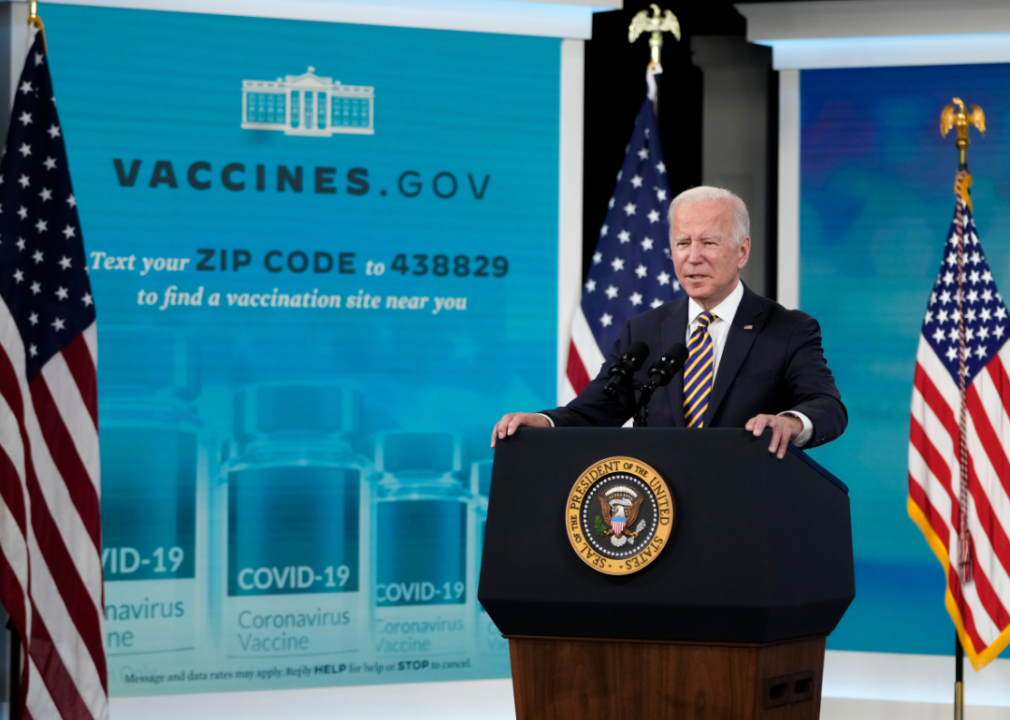PHOENIX — A challenge by Arizona’s attorney general to the Biden administration’s vaccine mandates for federal employees and contractors is legally and factually flawed, the U.S. Justice Department says.
In new legal filings, Justice attorney Joseph DeMott says there is no legal authority for Mark Brnovich to sue over what is clearly within President Biden’s power to deal with the pandemic. In fact, he said the president is legally immune from some of Brnovich’s claims, as are the people to whom he delegated that power.
DeMott also said Brnovich’s claims the mandates will hurt the Arizona economy, calling it “purely conjectural’’ speculation that private businesses with federal contracts will lose employees who do not want to get vaccinated.
“Arizona fails to submit credible evidence that the challenged vaccine mandates will hurt its economy,’’ he wrote. “Given the extraordinary disruptions that COVID-19 has caused to workplaces around the country, it is far more likely that Arizona will benefit from having a vaccinated workforce.’’
DeMott also derided one of the key points that Brnovich is hoping to use to void Biden’s executive order: His assertion that the Equal Protection Clause of the U.S. Constitution is being violated because the federal government is requiring its employees and contractors to be vaccinated while it does not impose a similar mandate on people crossing the border illegally.
DeMott said such claims are legally valid only when people in each group are similarly situated. And that clearly isn’t the case here, he said.
“U.S. citizens who are not federal employees, federal contractors, or covered contractor employees are not subject to these executive orders,’’ DeMott said. More to the point, he said, if there are people in this country who are not citizens but happen to work for federal contractors, they are subject to the vaccination requirement.
“There is therefore no basis to conclude that the orders discriminate on the basis of the national origin or alienage,’’ he said.
The pleadings come as Brnovich, a Republican candidate for U.S. Senate, filed another lawsuit Friday challenging the administration’s related orders requiring that all employees in companies with 100 or more workers be vaccinated. That will be subject to a separate legal proceeding.
Brnovich contends presidential power does not extend to telling people they have to be vaccinated.
DeMott said the president does have a legitimate interest. “The pandemic will not end until safe and effective vaccines are broadly administered across the population,’’ he told U.S. District Court Judge Michael Liburdi. “Yet as of this week, only 69% of adults in the United States are fully vaccinated.’’
That’s a federal issue, DeMott said, because the illness and death caused by the virus have led to serious disruptions for employers across the country. “The federal government is no exception,’’ he said.
DeMott said that’s why Biden said federal workers have to be vaccinated, as do employees working for companies with federal contracts.
“The president, as ultimate manager of procurement operations, determined that workplace safeguards aimed at preventing the spread of COVID-19 will decrease worker absence, reduce labor costs, and improve the efficiency of contractors and subcontractors at sites where they are performing work for the federal government,’’ he said.
“Slowing the spread of COVID-19 inherently promotes efficiency and economy for the simple reason that federal procurement — like any other business endeavor — suffers when the employees of entities that contract with the federal government get sick and miss work as the result of a deadly and contagious virus.’’
DeMott noted that a federal appeals court ruled earlier this year there is a “compelling state interest’’ in fighting the virus.
“And there can be no serious dispute that requiring individuals to be vaccinated is rationally related to that interest, as numerous courts have held,’’ he said.
He also said Brnovich misses a crucial legal point in his argument that there is a constitutional right to refuse medical care.
“The right to refuse vaccinations is not a fundamental right,’’ DeMott wrote. “And the Supreme Court held more than a century ago that a state may require all members of the public to be vaccinated against smallpox, under penalty of criminal sanctions. Tellingly, plaintiffs fail to reference any history or tradition that might reveal the existence of a fundamental right to avoid vaccination requirements (or conditions).’’
But it’s also a crucial fact, he said, that federal workers do have another option: choose to work elsewhere. In essence, he said Brnovich is trying to make this a claim that individuals have a right to hold federal employment while refusing to be vaccinated against a highly contagious virus.
“It is clear that the American legal tradition does not recognize any such right,’’ he wrote.
DeMott said there are other problems with the lawsuit.
He said states do not have legal standing to sue the federal government on behalf of their residents, as Brnovich is trying to do here.
To the extent state agencies subject to the orders have contracts with the federal government, DeMoss said their claims are issues of contract that cannot be brought in federal court.
The judge, Liburdi, has scheduled a hearing next week on whether to temporarily block enforcement of the president’s orders while he considers the legal issues.





